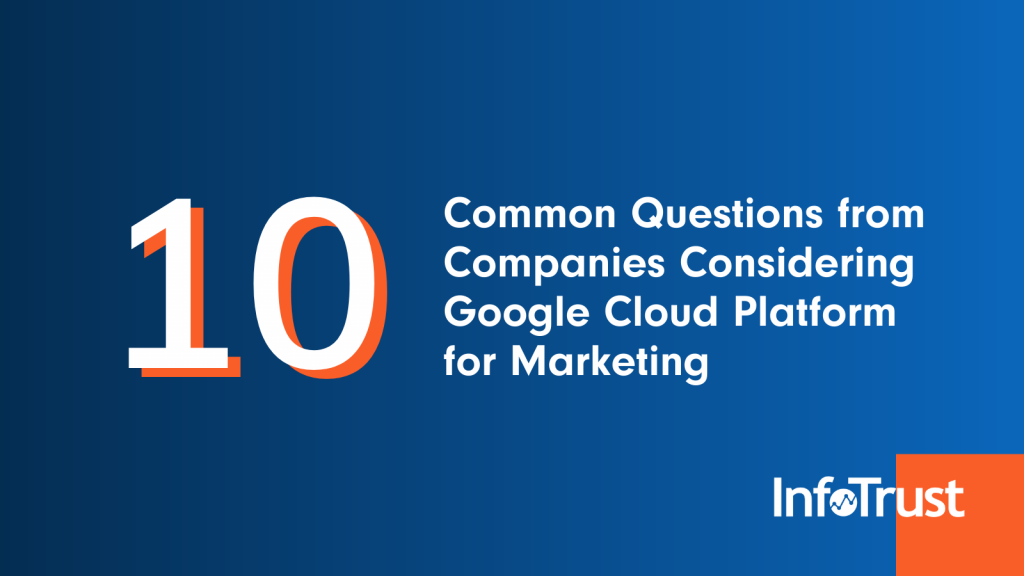For companies that use Google Marketing Platform (GMP), the integrations with Google Cloud Platform (GCP) offer ample opportunities to further refine and optimize their campaigns. As teams progress in their analytics maturity and start considering more advanced strategies, we often get questions about the benefits of using GCP for marketing and what is needed to get started. Here’s our list of top 10 questions from companies that are considering using GCP for marketing:
1. Is my organization ready to use GCP for marketing?
As there is enormous competition in the marketing technology space, it’s important to vet any potential platform to make sure it’s a good fit for the organization and worth the investment. Here are some questions you can ask to make sure your team is ready for Google Cloud Platform for marketing:
- Are we using GA360, GA4 and/or other GMP platforms (Google Ads, Campaign Manager, Display & Video 360, Search Ads 360, or Google Manager)?
- Is the team running into limitations with the reporting available through the UI or APIs?
- Do we have people with the skills to manage and make sure we’re getting value from the platform?
- Can we map out how GCP improves the organization’s ability to run campaigns or reach customers?
- Do we have a plan for how to showcase the value and ROI of GCP to our leadership team after the first year?
If you answered yes to these questions, your organization is probably in a good position to adopt GCP. Read on for more information to help with the decision-making process.
2. How much does it cost and what's included?
Although GCP includes dozens of resources that you can potentially utilize, the most common entry point for marketers is to set up the integration between Google Analytics and BigQuery (BQ), a cloud data warehouse. The integration exports the complete, hit-level dataset collected by GA to BQ, where analysts can query the data using SQL, create dashboards using Data Studio, or fit machine learning models using BQ ML.
When using BQ, you’ll accrue costs for data storage and processing. Depending on how much data you have and how much querying you plan to do, you may be able to take advantage of GCP’s free tier of service that currently includes 10GB of data storage per month and 1T of query data processing per month. Otherwise, storage costs depend on the quantity of data and how recently the data was modified. For processing, you can pay on-demand for queries or opt for flat-rate pricing if you are a high-volume customer.
You can also use the BigQuery Data Transfer Service to set up and manage recurring loads of data from Google Ads, Campaign Manager, Search Ads 360, and Google Ad Manager. There’s currently no charge for using the transfer service but you will pay for BQ storage and processing (same as for the GA integration). You can use these tables to perform your own analysis using SQL or share reporting via dashboards in Data Studio.
For advanced audience targeting, you can set up Ads Data Hub (ADH), Google’s new privacy-centric data warehouse. ADH allows you to connect Google’s log-level ad data with your own data, such as Google Analytics or offline conversions. In the ADH environment, you can run your own frequency and reach analyses, fit custom attribution models, and create audiences while Google enforces strict privacy standards.
For billing, ADH works alongside BQ. When you save the results of ADH queries in BQ or upload your own first-party datasets to BQ to join with the data in ADH, you pay for the BQ storage. Likewise, when you run queries in ADH that utilize data stored in BQ, you pay for the BQ processing needed to generate the results.
3. What are the key benefits of using GCP for marketing?
The key benefit to using GCP for marketing is that it is designed for activation in GMP, meaning that there are several ways to get value from GCP and improve the ROI. Here are 3 ways that GCP can help improve marketing outcomes:
- Customized analysis and dashboarding: having access to your data enables you to analyze it in a way that makes sense for your business and dashboarding enables you to share those insights within the organization
- Predictive analytics and machine learning: over the past few years, Google has released several new machine learning (ML) and artificial intelligence (AI) capabilities in GCP. Whether you have one analyst interested in trying modeling or a team of experienced data scientists, GCP has ML tools to make their work easier. For teams just getting started, BigQuery ML enables analysts to build ML models using an SQL-like syntax in BigQuery. For experienced teams, Vertex AI supports the entire ML workflow, including scalable pipelines, MLOps, and actionable explanations of model predictions.
Advanced marketing and industry-specific solutions: GCP has solutions tailored to 14 different industries, ranging from Retail/Ecommerce, Consumer Packaged Goods (CPG), Media and Entertainment, and Telecommunications. For example, Retail/Ecommerce companies can try Recommendations AI, a pre-built product recommendation engine, and CPG organizations can leverage Vision API Product Search to help customers more quickly find what they’re looking for.
4. Which GCP prodcucts does my team need to learn?
It depends on which integrations with GMP your team utilizes:
- Google Analytics integration: BigQuery, including SQL
- Integrations with Google Ads, Campaign Manager, Search Ads 360, and Google Ad Manager: Google Cloud Storage and/or Ads Data Hub
There are dozens of other resources your team could utilize in GCP but typically brushing up on SQL, reviewing the schemas and data collection model of the platform, and getting familiar with the GCP interface are enough to get started.
5. Which resources are needed for setting up GCP and how long will it take?
Like the previous question, it depends on which integrations your team wants to use. In this article, we outlined the steps to integrate GA360 and GA4 with BQ. The key to a smooth setup with each of the integrations is having the necessary permissions in GCP. With the proper access, setup of the GA-BQ integration takes less than an hour and data will start populating within 24 hours.
Set up of the data transfer service for Google Ads, Campaign Manager, Search Ads, and Google Ads Manager is also straightforward and can be done through the GCP UI or programmatically. Check out the links above for more detail on the frequency of transfers, refresh window, and backfill duration as they vary by platform.
Setting up ADH involves configuration within GCP and ADH, as described here. In our experience, it takes about 7-10 days for data to start populating in ADH after the configuration is confirmed.
6. Do I need a Cloud partner?
You can sign up for GCP directly with Google (unlike GA360 where this is very uncommon) or with a Cloud partner. Although it’s optional, working with a partner does provide several benefits. Earning GCP partnership status means that the company has demonstrated their expertise in GCP. They can provide the training and support you need to efficiently and effectively utilize the platform. Additionally, you can choose a partner with experience in your industry and that is a good fit for your organization’s needs. We think of it as a shortcut: you can move quickly to get set up and start showing the value of the platform without needing to invest upfront in training your teams to administer it.
7. Can I use GCP with my visualization tool (e.g. Tableau, Power BI, Looker, Data Studio)?
Yes, there are BQ integrations with Tableau, Power BI, Looker, Data Studio, and other dashboarding tools to enable visualization in your platform of choice. There are some differences in how the connectors work but we have partners who use each of these platforms alongside storing their data in GCP.
8. I’m already using another cloud provider. Can I move data from GCP to my existing Cloud environment (e.g. Azure, AWS)?
Yes, you can migrate data from GCP to Azure or AWS. We do have clients that regularly push data from GCP into another cloud environment as GA only natively integrates with BigQuery. Another approach we commonly see for large organizations is that GCP is used specifically for marketing data (to take advantage of the GMP integrations and ability to activate) and it’s used in addition to other cloud environments.
9. Can I be compliant with GDPR, CCPA, etc. using GCP?
Yes, GCP can help support your compliance with privacy regulations such as GDPR and CCPA. GCP can’t provide formal certification of compliance but gives organizations the tools, resources, and documentation to aid their own compliance efforts. Google has dozens of compliance offerings and certifications that satisfy region or sector-specific regulations.
10. Is GCP secure?
Yes, GCP has several layers of security. Data is encrypted in transit and at rest, by default. Security is also built into GCP’s infrastructure, including how services and hardware are controlled, identity management, and operational and device security. Check out these links for more detail on the GCP’s security products and best practices.


